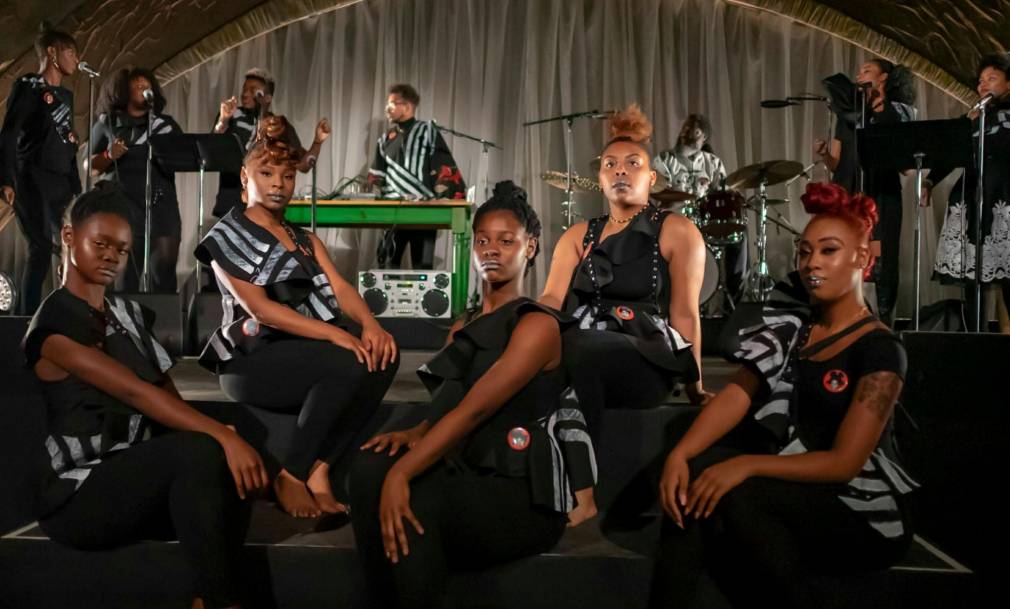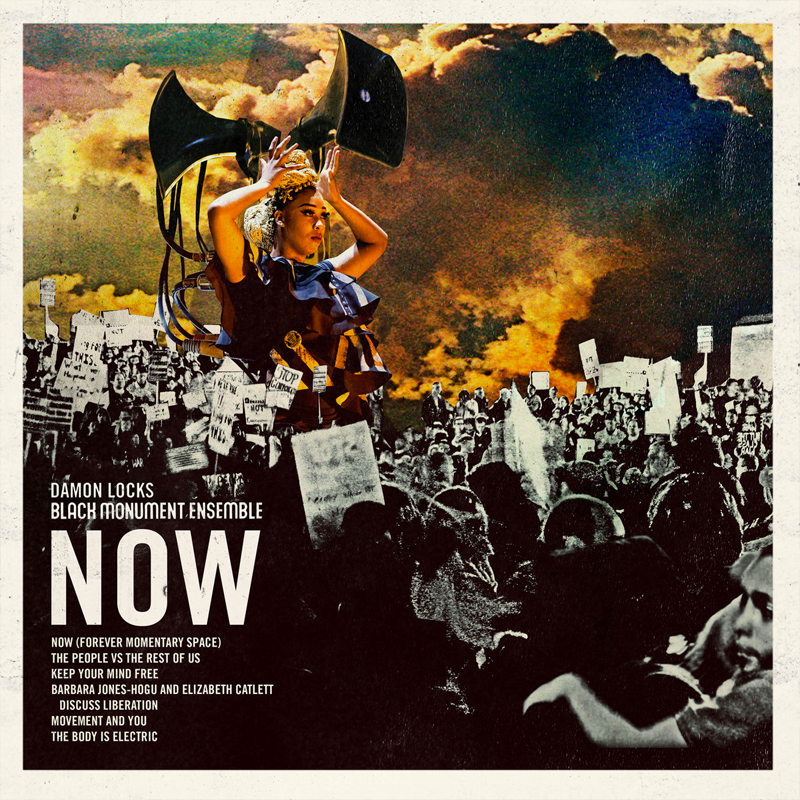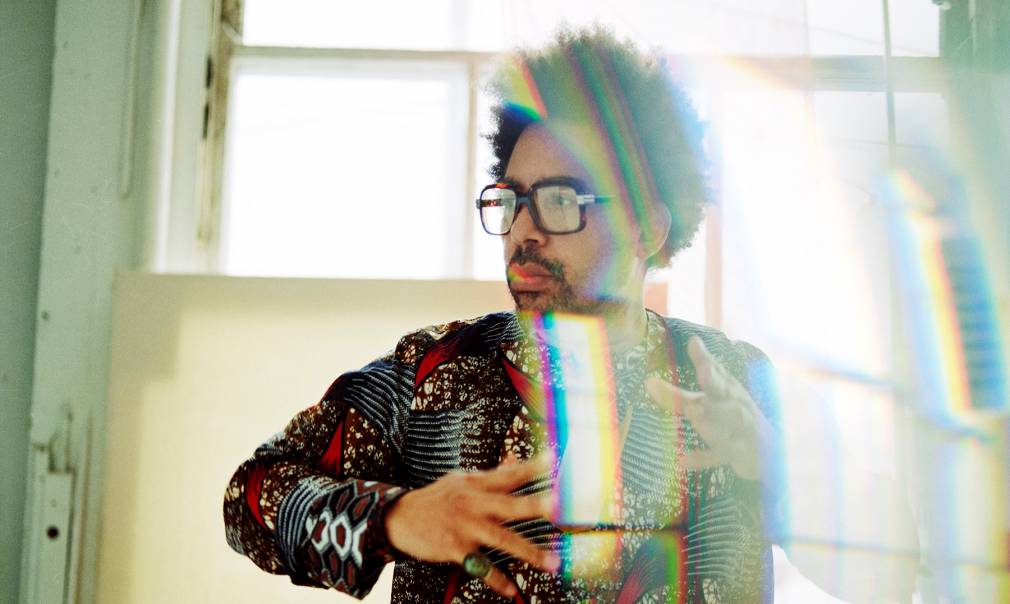In late August 2020, Damon Locks gathered singers Monique Golding, Phillip Armstrong, Tramaine Parker, Erica Rene, Richie Parks, and Eric Tre’von together with Angel Bat Dawid on clarinet and Ben LeMar Gay on cornet and melodica in the backyard of Experimental Sound Studios in Chicago. With the cicadas in perfect summer harmony and motion, weaving through the outdoor microphones, Damon Locks Black Monument Ensemble started putting together music that makes me think of Sonia Sanchez’s aching inquiry: “all summer long it has rained and the water rises in our throats and all that we sing is rumoured forgotten. Whom shall we call when this song comes of age?” – to this I believe the ensemble would respond – we shall call ourselves, over and over again. In a second session, one month later, Locks brings in the electronics, loops and samples, and makes a final appeal for joy by gathering the core percussive elements led by Dana Hall on drums and Arif Smith on percussion.
I want to thank Damon Locks, Monique Golding, Angel Bat Dawid and Eric Tre’von for their generosity. In many ways this piece feels like collective writing. It was such a pleasure to sit in the company of their own reflections and hear about the process and feelings that produced this latest album titled “NOW,” led by the surrealist intentions of stellar composer, visual artist and educator Damon Locks, who wrote the most beautiful liner notes that sit next to the music with unmatched consideration and vulnerability. The apprehensive energy of our time is represented in the liner notes, in the music and honoured in my interview with Locks and some of the BME members. In Lock’s reflection: “the experience of coming together to record this record was scary, exciting, communicative and jubilant.” Monique Golding sees this release as “a manifestation of what is happening in the world and a divine intervention and purpose.” For Angel the making of this album is a lesson in innovation and creativity where the flexibility that comes with close contact now signals potential threat to life. For Eric Tre’von it comes out of the need for something new: “a new language to explain what it is that we feel because there is a limitation to the language that we have been given, it doesn’t quite translate what we feel in our bodies all the time.” For me, NOW feels like a necessary slow feast, a moment in time for us to eat our feelings, to name the loneliness, and specify the catastrophe and anti-black technologies of harm that are reproduced under a pandemic.

This album is a form of black consciousness. South African anti apartheid activist and leader of the Black consciousness movement, Steve Biko, spoke about the urgency and future of black life as something that is implicated in the present sequence. Locks holds the line of a similar urgency by fashioning a sound that “acknowledges the past, addresses the present and prepares for the future.” His approach is telling that BME comes out of moments of continual enactment of intentional improvisation and collective individualism: “my job is to set up a framework or skeleton design in which people can be, hopefully, as true to themselves as they can artistically within that framework. I also hope that their energy, personality, feelings politically, socially can also be enacted in the group as well.” In order to produce sonic moments of social transformation and freedom we must pay attention not only to the act of music, but also to individual and collective practices of care that are forged in the delicate affirmation that friendship brings. Tre’von puts it: “We had to nurture our relationships before both the albums came out. A lot of us were already connected…it made it a lot easier to come together and see each other.” For me, what makes this album a radical intervention for our times, even if it’s not the intention, lies in how its existence stands as a product of an ongoing dialogical practice, where the music sounds like an extension to a commitment to community. Community here is a verb – an act of organising the roots. In Lock’s words: “The group becomes much stronger than the individual and much bigger than I could have created on my own so as we build we try to build relationships and build strength in us as people to make the music stronger.”
NOW sits in Robin D.G. Kelly’s description of radical art as work that “takes us to another place, envisions a different way of seeing, perhaps a different way of feeling.” In this place, we are able to deal with this twofold question: What do we do with this forced landing and make ourselves outside of this inherited wasteland? The ensemble’s clarinetist, Angel Bat Dawid reminds us that “music is the only way” – it is part of the toolkit for our thriving in the world. Placing emphasis on the need to be intentional about making space for the black consciousness to unfold, Angel directly states that this is the perfect ensemble and true to its name “it is a Black monument” and a cathartic space for Black artists across genre sensibilities and spectrum of experience to come together for expression.
This album opens with a track titled “Now (Forever Momentary Space)” in Locks’ poetic lyricism, form, and imagery. “Melodies in gold, dipped in sunlight Levitating song, laughter, delight” – Damon’s words can build boats strong enough to sail into the heart to deliver peace, love, joy, momentum for resistance, survival and for dreaming. Tre’von’s creative energy and vocal arrangement in this track brings out Locks’ lyrics and main melody. On the aesthetic reasoning and wisdom behind the vocal arrangements Locks explains: “listen to old gospel and Jamaican music where a lot of those vocals are built from hymns and old gospel…I listen to the strength of those melodies. There is something that feels quite familiar in the heart. There is a structure in those old hymns and a familiarity in there that I play with. I don’t use that structure but I think about how those things are laid out.” Angel’s clarinet solo on the same track is a stunning testament of what can happen when people are given space. Locks brings us into the presence of this recording by including the apprehensive moments that come with the territory of a pandemic, minimal contact and reduced takes in the quest to keep everyone safe. Reflecting on both sessions, it was about “how did that feel like and let’s move on.” The labour of instincts can be heard towards the end of this track where Angel’s like “how’s that sound Alex.“
Locks uses samples to play with the juxtaposition of ideas, build poetry out of conversations and speak to the unspeakable known things. For him, “the sampling has become just as informative, fluid and exciting as the vocalists, clarinet solo, or the drum rhythm. It’s giving another layer for you to process. It is just as important as the kick drum or the panga or the harmony or the clarity of intensity of the horn.” The message is clearly sustained in the explosive rhythm and aching pitch in “People vs the Rest of Us,” and in the jubilance felt in “Keep Your Mind Free,” a track about collective and individual mental health, beautifully weaved together by Ben LaMar Gay’s solo that feels like a gentle call for each to hold on to self for the mathematics of care to make sense. Locks selects samples from the possibilities presented by the language of dance in “Movement and You” – “push torso right as if pushing imaginary wall” – perhaps the call here is about directing momentum towards the inevitable, “give me the radio” “if you don’t give it to us, we gonna take it anyway.“
The album ends with a jubilant track “The Body Is Electric,” which lands with the sort of groove that encourages us to not coddle uncertainty, to trust forward and come together against the grain of punishing isolation and loneliness that this pandemic has hurled our way. In Tre’von’s words, “resistance starts in the body” – we are being invited to use its current for our thriving and joy. The sampling of Mattie Humphries’ articulation in the same track, “you must use the moment in-depth because you can’t stretch it out on either end and that time is just the difference between knowing now and knowing nothing because if you know now fully, its past present and future” is a call for us to cast our lot towards now and purify the air with insulated optimism.
This music is the gift that comes out when people have reckoned with the invitation of the present moment, to give breath and power to the hope that we dream for the future in this momentary space. It reminds the willing that hope is a way of life, a common universal experience and from our present pandemic limitations we can reinvent ourselves.
NOW available on Bandcamp.


